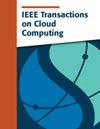在动态边缘网络中通过迁移强化学习加速人工智能生成内容的协同推理
IF 5
2区 计算机科学
Q1 COMPUTER SCIENCE, INFORMATION SYSTEMS
引用次数: 0
摘要
虽然扩散模型在计算机视觉任务中取得了显著的成功,但在物联网环境中的部署仍然具有挑战性。边缘设备在计算资源方面面临重大限制,必须适应动态操作条件。为了解决这些限制,我们提出了一种在动态边缘网络中加速人工智能生成内容(AIGC)协同推理的新系统。该系统引入了基于多出口视觉转换器的U-Net架构,通过在扩散过程中自适应选择出口点来实现高效处理,优化了推理精度和计算效率之间的权衡。为了优化设备级操作,我们开发了一种创新的生成式人工智能辅助强化学习框架,该框架可确定最佳退出选择和卸载策略,以最大限度地提高生成质量和推理速度。此外,我们设计了一种带有策略重用机制的微调方法,有助于在不同环境中快速部署强化学习算法。大量的实验评估表明,我们的系统在平衡推理延迟和生成质量方面优于现有算法,同时也表现出对环境变化的更好的适应性。本文章由计算机程序翻译,如有差异,请以英文原文为准。
Accelerating AI-Generated Content Collaborative Inference Via Transfer Reinforcement Learning in Dynamic Edge Networks
While diffusion models have demonstrated remarkable success in computer vision tasks, their deployment in Internet of Things environments remains challenging. Edge devices face significant constraints in computational resources and must adapt to dynamic operating conditions. To address these limitations, we propose a novel system that accelerates AI-generated content (AIGC) collaborative inference in dynamic edge networks. The proposed system introduces a multi-exit vision transformer-based U-Net architecture that enables efficient processing through adaptive exit point selection during the diffusion process, optimizing the trade-off between inference accuracy and computational efficiency. To optimize device-level operations, we develop an innovative generative AI-assisted reinforcement learning framework that determines optimal exit selection and offloading strategies to maximize generation quality and inference speed. Furthermore, we design a fine-tuning approach with policy reuse mechanisms that facilitates rapid reinforcement learning algorithm deployment across diverse environments. Extensive experimental evaluations demonstrate that our system outperforms existing algorithms in terms of balancing inference latency and generation quality, while also exhibiting improved adaptability to environmental variations.
求助全文
通过发布文献求助,成功后即可免费获取论文全文。
去求助
来源期刊

IEEE Transactions on Cloud Computing
Computer Science-Software
CiteScore
9.40
自引率
6.20%
发文量
167
期刊介绍:
The IEEE Transactions on Cloud Computing (TCC) is dedicated to the multidisciplinary field of cloud computing. It is committed to the publication of articles that present innovative research ideas, application results, and case studies in cloud computing, focusing on key technical issues related to theory, algorithms, systems, applications, and performance.
 求助内容:
求助内容: 应助结果提醒方式:
应助结果提醒方式:


